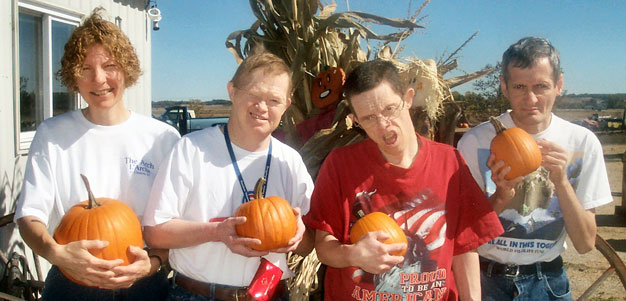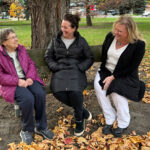
Kathy Berken is pictured with L’Arche Clinton — The Arch members George, Victor and Harlan in this file photo.
By Kathy Berken
I’ve encountered a number of public conversations and images about people with disabilities and the inspiration surrounding them lately. At the Paralympics this year, more than 4,000 athletes with a wide range of physical and intellectual disabilities competed in most every sport as the Olympics.
On NBC’s “America’s Got Talent” (AGT), Josh Blue, a comedian with cerebral palsy, made the final cut this season and last year, Kodi Lee, a blind and autistic singer/pianist, took home the million-dollar first prize.
Then I watched a TED talk by Stella Young, the late 32-year-old Australian comedian and activist who had osteogenesis imperfecta, which caused her bones to break easily. Her message was that she did not want to be anyone’s inspiration. “When people say you’re an inspiration, they mean it as a compliment,” she said, only a few months before her death. “We’ve been sold this lie that disability makes you exceptional and it honestly doesn’t. … I want to live in a world where we don’t have such low expectations of disabled people that we are congratulated for getting out of bed and remembering our own names in the morning.”
When she began teaching a law class, one of her students asked her when she was going to give her motivational speech. She was taken aback: “This kid had only ever experienced disabled people as objects of inspiration. We are not, [but] to this kid — and it’s not his fault — I mean, that’s true for many of us.”
I always wondered if AGT finalists Kodi and Josh got that far because of their disabilities and not their talent. My gut says yes. But I think this issue is complicated.
First, it’s important to respect people as children of God, regardless. Scripture gives us a blueprint: “Be kind and compassionate to one another, forgiving each other, just as in Christ God forgave you” (Eph 4:32). And, “Be like-minded, be sympathetic, love one another, be compassionate and humble” (1 Peter 3:8).
Second, it’s important to see people through the layers of their complexities. I learned this over the 10 years I lived and worked at L’Arche Clinton — The Arch, a community of 19 adults with intellectual disabilities and the assistants who came to help. I experienced the “mutuality of relationship,” a charism of The Arch. At the risk of appearing to objectify the core members (the persons with disabilities), I will admit that many of them inspired me to be a better person.
Although it is my personal choice to feel inspired by anyone or anything, I still have the responsibility to see people as people, and not mistake a disability as a reason alone to be inspired. I think that’s where we cross the line.
Stella is right when she laments, “For lots of us, disabled people are not our teachers or our doctors or our manicurists. We’re not real people. We are there to inspire.” She said she was not here to inspire, but to be herself and hoped you would relate to her as Stella, not disabled Stella.
Over the past many decades, our relationships with persons with disabilities have grown in a positive direction. Do you remember those huge institutions that hid people away? When we considered a person with a disability less-than, and all the attitudes and behaviors we had before the Americans with Disabilities Act of 1990 passed?
Perhaps the pendulum has swung too far in the opposite direction. We’ve paved many paths for people with disabilities and now we often glorify them for all the wrong reasons.
The bottom line for me is to be aware of and treat another person as a child of God who deserves respect, understanding, and compassion, whether that person has a disability that we know of, or not.
(Kathy Berken is a spiritual director and retreat leader in St. Paul, Minnesota. She lived and worked at L’Arche in Clinton — The Arch from 1999-2009.)











